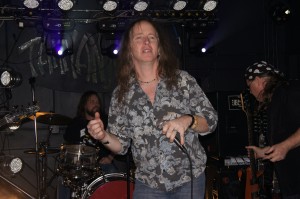 Led Zeppelin tribute band Custard Pie and Pink Floyd tribute band Gilmour’s Breakfast played a slamming double bill at Worcester’s Tammany Hall last night. Custard Pie and Gilmour’s Breakfast not only played these songs exceedingly well, they channeled the vital energy and head rush associated with the two stadium bands that launched the classic rock era.
Led Zeppelin tribute band Custard Pie and Pink Floyd tribute band Gilmour’s Breakfast played a slamming double bill at Worcester’s Tammany Hall last night. Custard Pie and Gilmour’s Breakfast not only played these songs exceedingly well, they channeled the vital energy and head rush associated with the two stadium bands that launched the classic rock era.
Custard Pie started the show with rippling guitar work from Jon Hathaway on “Communication Breakdown.” Hathaway’s burst of lead notes during the break made the guitar cry out. Vocalist Mark Moretti easily handled all the vocal melodies that were originally written for Plant. He sings in almost the same register and has a similarly sweet timbre. The heavy, palpable drumming of Ben Banning and the throbbing bass runs from Pat Lynch gave edge to this music while the voice and the guitar mounted all of their fulsome, three-dimensional grooves.
Hathaway’s fingers pressed out more staccato shrieks of high pitched frenzied notes on “I Can’t Quit You, Baby.” His guitar screamed out the desperate pain that the song is about. Moving onto “Black Dog,” the boys found that perfect stop-start groove which showcased how well bassist Lynch and drummer Banning kept these Led Zep tunes leaping forward, with deep down cool heaviness in the pocket pounding.
“Ramble On’ found Hathaway giving light touches to those slippery blues notes before the explosive charge of lead guitar and thunderous rhythm section then switching back to his mellower, bluesy leads. Moretti was able to bring forth the energy and talent to put his voice into any of these songs without ever becoming a Robert Plant imitator.
Gilmour’s Breakfast keyboard player Harry Lawton helped out with the swaying hippie groove to “Misty Mountain Hop.” Harmony vocals too gave this plenty of lift, three-dimensional and brimming. The rhythm section made the whole thing sway around a simple groove, making a monumental song out of a steady persistence.
Blues epic “Since I’ve Been Loving You” was, last night, born out of the cool, graceful application of Hathaway’s blues leads and the smooth flow of low end notes. Moretti kept the tension simmering just below the surface with tasteful self-restraint until it was time to be more daring with loud wailing. The vocalist also handled the English folk music influences and shifting dynamics on the Zep arrangement of “Babe, I’m Gonna Leave You.” Hathaway’s snappy take on the guitar melody got a boost from Pat Lynch who put a lot of feeling into his four string shadowing of the mellow octave guitar leads.
The light show at Tammany Hall occasionally turned the players into purple silhouettes standing behind a blinding spotlight. The effect was great on the epic guitar and vocal give and take during “Dazed And Confused.” The dark eerie tones of this huge number came to life, Hathaway’s variety of icy notes, heavy chords, and startling violin bow effects brought out the scary madness. The sounds made me feel somebody was leading me down a cold concrete stairway into a netherworld of demons, inner torment, and tortured souls. All that drama in the music reminded me of a time in my youth when I dropped acid before listening to the side two live version of “Dazed And Confused” on The Song Remains The Same. I had looked into my bathroom mirror and saw an image of my face falling off my bones and skull. Last night’s version of “Dazed And Confused” has the come the closest to giving me flashbacks.
Hathaway’s wild slide effects on “Whole Lotta Love” were created with his use of a pair of pliers. He recreated the theramin portion of the number with hissing, moaning notes sparking off of his six string. The boys played the live version popular in the 1970s and portions had different shifts than the versions commonly found on Led Zep’s live albums. The band went into part of Wanda Jackson’s 1950s rockabilly hit “Let’s Have A Party.“ Perhaps Hathaway reached into his large bootleg collection and found this version. Still, the rhythm section really punctuated the lead guitar break with their hearty resonance.
Hathaway unleashed his double neck guitar for “The Song Remains The Same.” His playful notes on the 12 string atop resonated meaningfully on the six below. The rhythm section here was paramount in building the mountainous climbs of this arching rock masterpiece, and Moretti let his sweet highs whistle over the surface of a wide lake of sound.
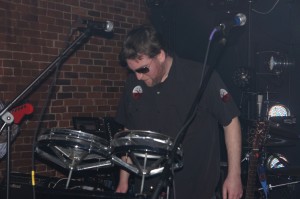 Gilmour’s Breakfast began their half of the show with a precise rendition of the lengthy epic “Echoes” that made up side two of Pink Floyd’s 1971 album Meddle. Rob Taylor’s lead vocal was almost mesmerizing in its deep exploration of all the colors and tones, moods, and emotions conveyed. Humming lead guitars fade into killer phrases that penetrated the consciousness with this driving, sometimes scary resonations. Keyboardist Harry Lawton whipped up a lot of organ chord stabs of classic rock richness in this labyrinth of instrumentation.
Gilmour’s Breakfast began their half of the show with a precise rendition of the lengthy epic “Echoes” that made up side two of Pink Floyd’s 1971 album Meddle. Rob Taylor’s lead vocal was almost mesmerizing in its deep exploration of all the colors and tones, moods, and emotions conveyed. Humming lead guitars fade into killer phrases that penetrated the consciousness with this driving, sometimes scary resonations. Keyboardist Harry Lawton whipped up a lot of organ chord stabs of classic rock richness in this labyrinth of instrumentation.
“Breathe” required the pedal steel guitar work of Martin Stewart to ride with majestic, atmospheric waves amidst the busy instrumentation, dreamy groove, and special effects. Stewart’s melodic line spoke to you between the lines of complex rhythms and special sound effects. Taylor’s mad cackling and spoken unintelligible monologue made you feel you were witnessing someone’s descent into madness.
A multitude of chiming, ringing bells plunged Gilmour’s Breakfast knee deep into “Time.” Taylor had his own drum pieces up front, adding extra wallop to the drama. Taylor doesn’t extend his range very often or caterwaul. He does, though, milk many nuances in his lyrical lines for their ultimate emotive effect. The “Breathe Reprise,” with its almost conversational pace featured Matt Swanton’s alto saxophone melody probing the R&B side of Pink Floyd, with the old fashioned dance hall beat at once serious and soothing.
The part-rock, part-R&B 1970s FM staple “Money” got a feisty interpretation from Gilmour’s Breakfast guitarists and bass player. It was like the whole band, with their multitude of chords and notes intersecting here, there, everywhere, wove a musical tapestry before setting that tapestry ablaze with even further incendiary playing. “Us And Them” began with a sprinkling of amicable guitar notes christening the room before Swanton’s mellifluous sax line unfurled and made its way smoothly in and around the groove.
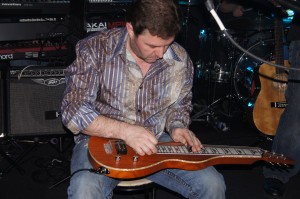 Gilmour‘s Breakfast brought out the best in several other songs. “Brain Damage” was marked by the eerie lead guitar that slowly peals away your defense mechanisms with its persistent tinkling. “Comfortably Numb” was a slow boil build up to a powerful sonic structure and the lead guitar crescendos loomed large. “Shine On You Crazy Diamond” was a potent launch of keyboard wizardry and dual lead guitars. The cavalcade of instrumentation was immense, pulling the listeners into Floyd’s anthem exploration of a man who lost his mind while living under extraordinary pressure. Stinging guitar notes were loaded with expressions of fear, isolation, and darkness. When you hear this music played live, you get a clearer understanding of why Pink Floyd music has remained popular for four decades. It’s a reflection of a collective madness we all experience at some time or other as human beings struggling to get through life in an increasingly indifferent, mechanized, fast-paced world.
Gilmour‘s Breakfast brought out the best in several other songs. “Brain Damage” was marked by the eerie lead guitar that slowly peals away your defense mechanisms with its persistent tinkling. “Comfortably Numb” was a slow boil build up to a powerful sonic structure and the lead guitar crescendos loomed large. “Shine On You Crazy Diamond” was a potent launch of keyboard wizardry and dual lead guitars. The cavalcade of instrumentation was immense, pulling the listeners into Floyd’s anthem exploration of a man who lost his mind while living under extraordinary pressure. Stinging guitar notes were loaded with expressions of fear, isolation, and darkness. When you hear this music played live, you get a clearer understanding of why Pink Floyd music has remained popular for four decades. It’s a reflection of a collective madness we all experience at some time or other as human beings struggling to get through life in an increasingly indifferent, mechanized, fast-paced world.
Bassist Bob Cooper played some of the finest four string lines of the evening on “Hey You,” a tune that slides into groove on its bass note, smooth, fulsome parts that have a life of their own. “Pigs: Three Different Ones” had the mischievous tone and sneaky guitars and keyboards that catch you off guard with their snappy adherence to its clever groove. Reaching into Barrett-era Floyd, Gilmour’s Breakfast went boldly into “Astronomy Domine,” a 1960s drug influenced work that showcased another climbing musical adventure. Soon, the boys were back into “Echoes,” segued into “Careful With The Axe, Eugene,” dabbled in “Obscured By Clouds,” and landed hard on “Young Lust,” the rocker from The Wall highlighted by a speedy, jazzy organ break.
Ending their show with selections from The Wall, Gilmour’s Breakfast put out slabs of organ and guitar chords on “In The Flesh” and plenty of rebellious energy on “Happiest Days Of Our Lives/Another Brick In The Wall Part Two.”
The dedication it takes to get all that complex Pink Floyd music down pat and to keep it fresh and exciting cannot be understated. Gilmour’s Breakfast have terrifying talent.
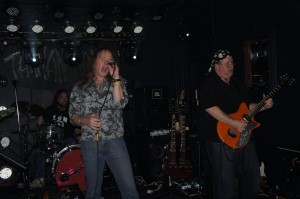

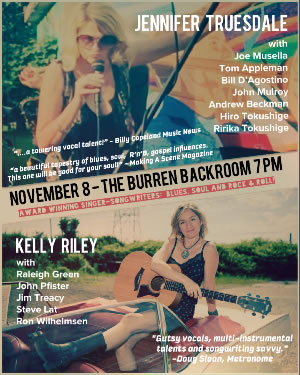
Thank you for the great review Bill!